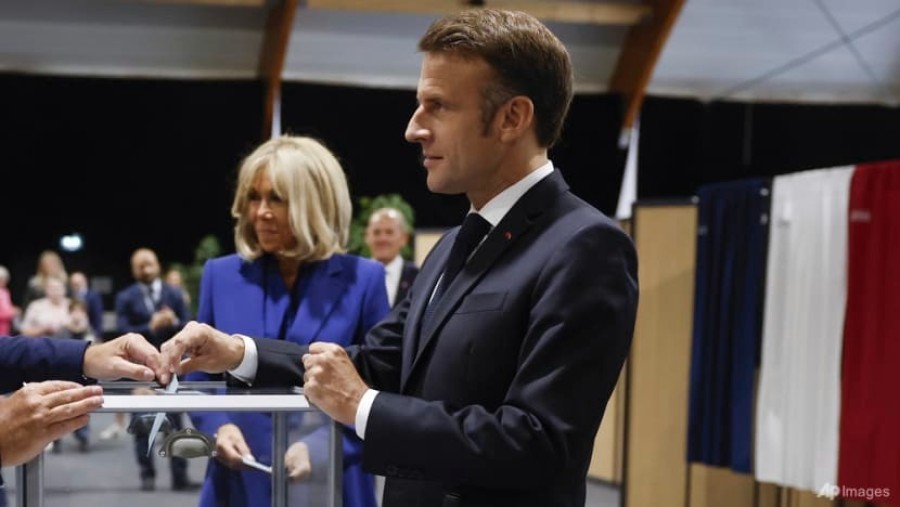France in Limbo After Macron Gamble Deepens Political Deadlock

Emmanuel Macron refused his prime minister's resignation on Monday (Jul 8), as the president scrambled to maintain France's credibility after his snap election gamble failed to break the political deadlock.
The left-wing New Popular Front (NFP) won the most seats in Sunday's second-round parliamentary vote, defying polls to beat both Macron's centrists and Marine Le Pen's far-right National Rally (RN).
But no group wields an outright majority and no obvious candidate for prime minister has emerged. Many in France were relieved by the outcome, with cheering crowds gathering in Paris to celebrate.
But potentially divisive talks on forming a new government were just beginning, three weeks before Paris hosts the Olympics.
Prime Minister Gabriel Attal submitted his resignation to Macron but was asked to remain in power in a caretaker capacity to see out the Games - and reassure the international community
In a sign of concern about the financial impact of a political crisis in the European Union's second-largest economy, business leaders' group Medef urged any new government to offer "clear and stable economic policy".
Ratings agency S&P, meanwhile, warned that France's credit score would be "under pressure" if Paris does not "reduce its sizeable public deficit", less than two months after its latest downgrade.
"NO ILLUSION"
The Paris stock exchange opened 0.49 per cent down, rebounded and then closed in negative territory as France digested the situation, unprecedented in recent history.
The international reaction was muted and mixed. France's EU partners are relieved that Le Pen's Eurosceptic outfit will not come to power, where they could endanger future European integration and Western support for Ukraine.
German Chancellor Olaf Scholz told reporters he was "relieved" and hoped "the president and the elected MPs will manage to bring about a constructive government".
Moscow tried to mask its disappointment. Kremlin spokesman Dmitry Peskov said Russia would have preferred a win by a party "ready to make the efforts to restore our bilateral relationships" but now harboured neither "hope nor particular illusion on this matter".
In Paris, Socialist Party leader Olivier Faure said the NFP's allied parties would choose a candidate to replace Attal, "either by consensus or a vote", this week. But the debate on the left about Cabinet names will be fierce.
The biggest NFP component is the hard-left France Unbowed (LFI) of firebrand Jean-Luc Melenchon, a divisive figure who is anathema to the right and centre and has alienated many fellow leftists.
Melenchon on Monday evening told the LCI broadcaster his party "had several candidates to suggest" to lead government, appearing to exclude himself.
The unprecedented situation is taking shape just as Macron is due to be out of the country for most of the week, taking part in the NATO summit in Washington.
DIVIDED PARLIAMENT
After they won the Jun 30 first round of the elections by a clear margin, Sunday's results were a major disappointment for Le Pen's RN, despite boasting its biggest-ever contingent in parliament.
Macron's centrist alliance will have dozens fewer members of parliament but held up better than expected and could even end up in second when seat numbers are confirmed.
The NFP - formed last month after Macron called snap elections - brought the previously deeply divided Socialists, Greens, Communists and LFI together.
Projections and provisional results show the NFP will be the largest bloc in the new National Assembly with around 190 seats, Macron's alliance on around 160 seats and the RN on about 140.
No group is close to the 289 seats needed for an absolute majority. Only one week ago, some polls had indicated the RN could win just such an absolute majority, with Le Pen's 28-year-old lieutenant Jordan Bardella becoming prime minister.
Instead, he will remain a member of the European Parliament, taking the helm of a new far-right grouping in which the RN will be the largest member, alongside allies like Viktor Orban's nationalist Hungarian governing party Fidesz and Italy's League.
In the French campaign, "I take my share of responsibility, as much for victory in the European elections as for (Sunday's) defeat", Bardella told reporters Monday. "But time is on our side, and we will keep working to convince the French people," he added, predicting a "wave that will bring (the RN) to power".
